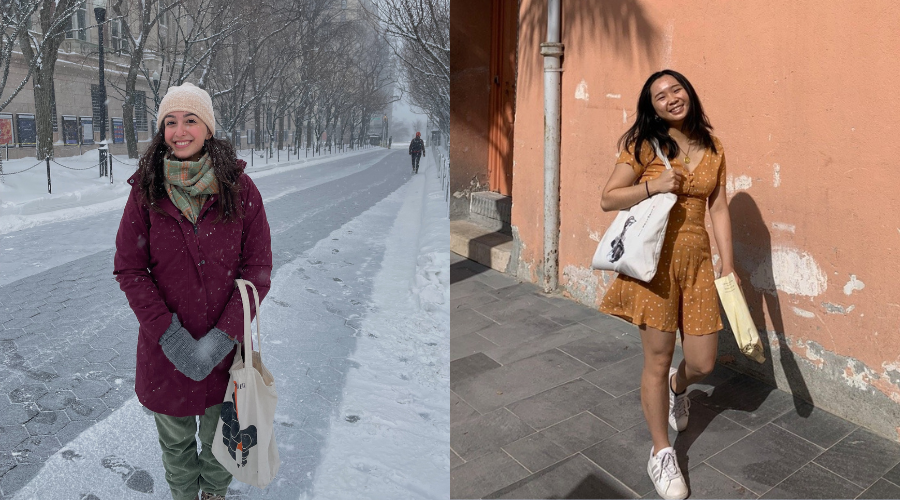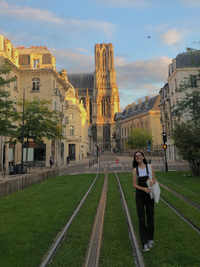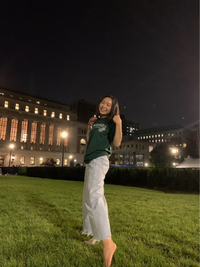Acclimating to Life at Columbia as a Dual Degree Student
As our newest third-year Dual BA students arrive at Columbia, we asked two rising Dual BA seniors, who went through the transition to the Columbia campus in the fall of 2021, to share their stories.

Columbia GS’s International Dual BA Programs provide a one-of-a-kind international education. On top of having access to the resources and network of not one but two world-renowned colleges, Dual BA students have the opportunity to immerse themselves in two distinct cultures and campus communities during their undergraduate careers, opening up an unprecedented treasure trove of unique traditions, priceless connections, and life-changing experiences.
Along with the excitement of this distinctive collegiate path, there can be some apprehension. After all, adjusting as a young student to one college campus is a daunting task, much less two, and this is precisely what Dual BA students do, acclimating to their international campus as a first-year before coming to Columbia as a rising junior and acclimating all over again! Furthermore, many Dual BA students aren’t just leaving home for college, they are traveling thousands of miles from their families to one or both of their campuses. Nonetheless, Dual BA students who seize this challenge are more than rewarded for their efforts, crafting a college experience for themselves defined by adventure and innovation.
As our newest third-year Dual BA students arrive at Columbia, we asked two rising Dual BA seniors, who went through the transition to the Columbia campus in the fall of 2021, to share their stories. Anne Nguyen ‘23GS and Nikka Afshar ‘23GS reflect on why they chose the Dual BA program, how they found community on two campuses, and share advice for their fellow Dual BA students.
What is your campus and major?
Anne: Reims campus. At Sciences Po, I majored in Political Humanities and minored in Sociology. At Columbia, I’m majoring in Medical Humanities.
Nikka: Reims Campus. At Sciences Po, I majored in Political Humanities, and at Columbia I am majoring in Philosophy.
Why did you choose the Dual BA program?
Anne: My high school was a magnet school for STEM, so while I was very well-versed in biology lab techniques, I never did Model United Nations or debate. Still, growing up in the Washington D.C. area, I always existed in the sphere of politics and diplomacy. For that reason, I think I’ve always been oriented toward the humanities and I wanted to do something more with my college experience than just following the biology major, pre-med track. The Dual BA program with Sciences Po was the perfect opportunity for me to push myself to explore areas that I wasn’t familiar with, like political science, and truly live in a different culture in France. I wanted to learn by living and experiencing. I thought—and still believe—that these experiences would bring richness to my life experience, and be an asset for my future path in public health and medicine.
Nikka: When researching universities, I had always considered applying to an international school. I found Sciences Po independently, because of my academic interests in international affairs and politics, and decided to apply for undergrad. Afterwards, I discovered the Dual BA, which seemed like an even more perfect fit for me. While I was interested in experiencing life in another country, I knew I would ultimately want to continue my postgraduate education in the U.S., which is why a dual degree program made a lot of sense for me logistically. On top of that, it allowed me to explore different areas of academic interest, and experience two vastly different academic cultures and environments.
What were the best and most challenging parts of traveling to and navigating life at your university as a first-year?
Anne: My first year in France was a big adjustment period for sure! Since I came into Sciences Po fluent in French, I didn’t anticipate that I’d also have to adjust culturally, not just linguistically. Reims has its charms, and I’m attached to it in many ways: I loved taking solo walks through the city and in the parks, living within a five-minute radius of three bakeries where I would buy baguettes for less than a euro, and going to the farmer’s market every Sunday to buy fresh vegetables. At the same time, I also had to face both small inconveniences (all the stores close at 6pm!) and bigger cultural shocks. In particular, I went from attending a high school that was 70% Asian to living in a town where I was one of few Asian people and the only Vietnamese person on campus. I did feel isolated from my community (and missed Vietnamese food), but thanks to the wonderful people I befriended both at Sciences Po and from other places, I created my own niche. For example, I accidentally discovered a Vietnamese temple in Reims, where I attended some New Year’s Eve events and had Vietnamese food from some nice aunties!
Nikka: I think the best part of navigating Sciences Po as a first-year is that it allowed me to grow in more ways than I had initially imagined. Transitioning from living at home with three family members to moving to a different continent and 6,000 miles away from family taught me a lot about myself. Not only did the Dual BA help me grow academically and professionally, but personally as well. The hardest part was that I moved to France without knowing any French, so everyday tasks that I had never placed any importance on (like going to a post office or picking up a prescription from the pharmacy) suddenly became monumental and stress-inducing. I also found it difficult to transition into the French academic system and its expectations. Since I had grown up with and become accustomed to the American education system, I had to readjust some of my academic habits and expectations, in order to follow French academic methodology.

What was it like coming to Columbia as a junior? What were the best and most challenging parts of the transition?
Anne: When I first arrived at Columbia, I thought that entering as a junior was a handicap, but I think of it now as such a strength. Having lived in a different place for two years gave me the maturity and perspective to take in a new environment as chaotic as New York with more calmness. The NSOP orientation events were also helpful in catching up, and I loved being able to lean into my Dual BA network, including people coming from campuses other than Reims.
It can be challenging to make new friends within Columbia as a junior. Slowly, I learned that the best friends come organically and from places where you wouldn’t expect, from a club interview that turned into a Harry Styles concert breakdown to a department dinner.
Nikka: I was really nervous about the transition, because I didn’t know what to expect, but the transition was honestly fairly seamless. There are so many resources at Columbia to advise and support you, I felt like I had people to turn to for help when I needed it, which made a huge difference for me in the time shortly after I moved to NYC. I think the best part for me was the academic transition. I really enjoy the academic environment at Columbia, and I feel supported by the faculty here, which helped me feel excited about school from the start. The most challenging part of the transition was meeting new people outside of the friends that came to Columbia with me from Reims. I thought that it would be much easier to meet new friends from GS and other Columbia colleges than it actually turned out to be. Entering into a college as a junior has its social challenges, since there are people who have been attending Columbia in your grade far longer than you have, who already have a group of friends.
What groups/clubs/activities have you gotten involved with at Columbia? How did you go about finding them and joining?
Anne: I’m passionate about advocating for community health, especially in underserved communities. To pursue this goal, I became involved in different specific activities at Columbia. I’m one of the social media directors for Columbia Public Health Club, a co-head of activities at CU Nourish (a food sustainability club), and an advising fellow at Matriculate, which aims at advising underserved high schoolers through the college application process. A lot of these clubs continue my activities and interests from both high school and Sciences Po. For instance, a lot of my work at CPHC is related to my work managing the social media accounts of a club at Sciences Po aiming to end period poverty. Nourish gave me the opportunity to explore my interests in a different direction, as I realized that community health is only possible with equity of access to quality food, and I wanted to explore how food systems are structured in an urban environment like New York.
I’ve also been very involved off-campus, particularly with food sustainability. In the spring semester of my junior year, I had the opportunity to intern with an organization running food rescues to save and redirect food to places of need. This semester, I’m continuing my involvement with a community health center in Chinatown, Manhattan, where I interned this summer, to present our work at a conference. Just keep your eye out on places like Handshake for any internships and opportunities that are related to your interests and current involvement in clubs. You never know what could crop up.
Nikka: I am the co-president of the club Peace by Peace, which teaches conflict-resolution curriculum to elementary school students in Harlem. I got involved with Peace by Peace at activities fair, after seeing their table and completing the interest form to volunteer. Through Peace by Peace, I also got involved with Community Impact, since Peace by Peace is a Community Impact club. I am on the student executive board of Community Impact, a nonprofit which runs the university’s community outreach clubs and programs.

What advice would you have for third-year Dual BA students who are about to start at Columbia?
Anne: You’re going to find your place at Columbia and in New York—don’t worry! I wouldn’t hesitate to lean upon the Dual BA network, for both academic help and just friends. Ask for help from the people you already know. Most things, like learning Columbia lingo (a never-ending quest, as I personally still don’t know what or where most dorms are!), will come to you over time. Before you know it, you’ll have your favorite study niche in some random library and you’ll know what days have the best dining hall food.
I’d encourage you to push yourself to explore all the resources available to you. Reach out to GS advisors and figure out who you mesh best with. Go down less traveled paths. (St. Paul’s Chapel has an organ meditation every week for an hour; try it out.) Take advantage of the GS events out in the city. Get involved in clubs that aren’t always directly related to what you did before. Lastly, and probably most importantly, push yourself to leave the Morningside bubble. There’s so much in the city beyond W 113th Street. New York is such a unique urban ecosystem that you’ll never find elsewhere. You could be so directly involved in groundbreaking initiatives that you end up spearheading and bringing to other parts of the U.S. and abroad. Or, just as importantly, you could be eating well, seeing Broadway shows, and finding your favorite small shops in the city (outside of Manhattan especially).
Nikka: I would advise them to take advantage of the different opportunities provided by the school to meet people and get involved on campus: you only have two years on campus at Columbia, and it is important to try and make the most of it, especially entering as a junior.
